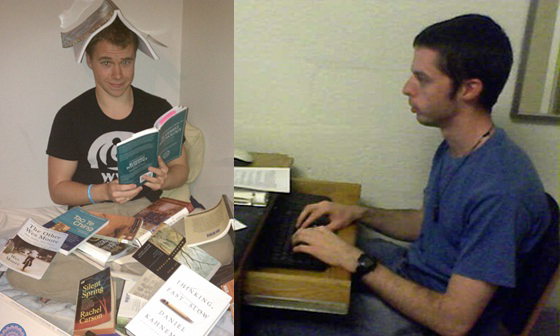This week, Jock Gilchrist, Chris Hartung and Patrick Byrd talk about how their investigations into human thought and behavior.
Jock Gilchrist: “Sustainable Progress: Human Behavior and Methods of Social Change”

“I’m hoping to learn how we can achieve the most effective social change that betters society in a permanent, sustainable way so that we can continue to subsist on earth without facing major environmental, governmental, or economic meltdowns–even, dare I say–not just avoid catastrophe, but inspire a healthful and beneficial way of existing.
For me, the thing most exciting about doing research for a senior thesis is being able to pursue a topic I’m personally interested in without the fetters of a typical academic course. The most challenging part of my research is compiling the important ideas from different sources and synthesizing them into something coherent.
I want my career to be based around spreading the concepts of real sustainability to the wider public, whether that means through environmental organizing, journalism, or teaching. If I go for a Masters or PhD I want it to be in Climate Science, Religious Studies, or Sustainable Development. My thesis is providing a solid basis to pursue one of those fields”
Chris Hartung: “Thomas Aquinas on Free Will”

“The most exciting thing [about writing a thesis] is finding elements of Aquinas’s thought which no one else seems to have noticed before. The most challenging part is finding all of the relevant secondary sources, especially since some of them have never been translated from the original Latin/French/Italian. I’m hoping to learn more about the philosophy of St. Thomas, since he is probably the greatest Christian philosopher of all time. I’m planning to go into seminary next year. Writing this thesis will give me a head start on the philosophy courses, since they put so much emphasis on St. Thomas.”
Patrick Byrd: “How Do We Talk About Vagueness”
“The most enjoyable thing about research, particularly with philosophy, is seeing the myriad of viewpoints that others have. Some are common ones, while others can be really off the wall at times. Over time, though, one begins to see a conversation form with individuals responding in articles and referencing one another.
I guess the most challenging part of the research is trying to find support for my view. At times I have been a staunch supporter of one stance, but am forced to change my mind based upon a very good argument, even if I don’t like it. But I guess that’s the goal in research.
In doing this research I set out one goal to maintain. I wanted my “solution” about vagueness to reflect how the “folk” feel about the issue. Basically I wanted to understand why do we have the normal opinions one could have on vagueness, and try to support that. My inclination is that the way we commonly use our language is done so for a reason, and that reasoning needs to be taken into consideration. However, I need to find support for that inclination, which has always been important to the way I think about philosophy.
I plan on entering a doctoral program in philosophy. These can be quite competitive, thus having the senior thesis project would be an asset in such.”



